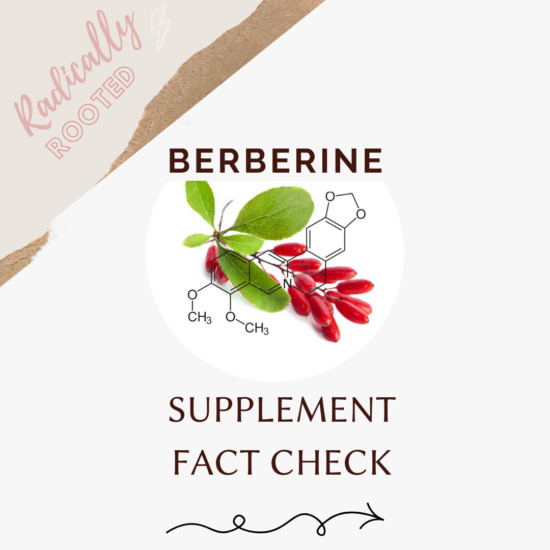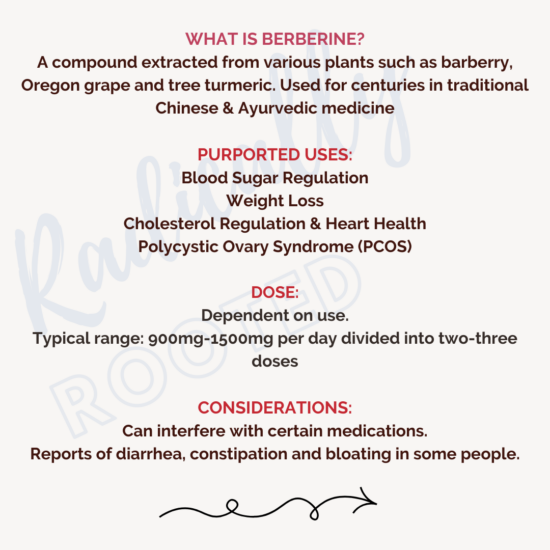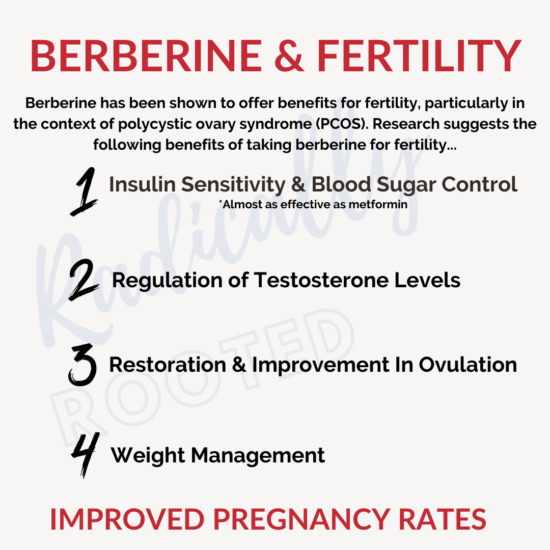Berberine- Supplement Check
In recent years, many clients come to me with a growing interest in exploring natural supplements for their health benefits. One supplement that has garnered some attention this year is berberine, pronounced as bear-ber-rin. From TikTok to Instagram, there is a high chance you have heard from it somewhere. With all of these different products being offered it is crucial to understand the potential advantages and considerations associated with taking berberine as a supplement. Berberine is a bioactive compound that has been studied for its potential in promoting overall well-being and supporting various aspects of health. I’m here to explain everything you need to know about berberine.
What is Berberine and Where Does it Come From?
Berberine is a natural compound that can be found in different plants, especially in their bark, roots, and stems. Plants like goldenseal, barberry, Oregon grape, and tree turmeric contain berberine, which is typically yellow and has a bitter taste. There are several methods to extract berberine from plants. For centuries, berberine has been used in traditional Chinese and Ayurvedic medicine due to its potential health benefits.
>>How Weight Affects Fertility in Women
How Does Berberine Work?
Hundreds of studies have been conducted on berberine, which has been proven to have a range of functions inside the body’s cells.
According to animal studies, one of the main actions of berberine is to activate an enzyme inside cells called AMP-activated protein kinase (AMPK).
The primary function of AMPK is to monitor and regulate the use of glucose and fatty acids which play a central role in regulating the body’s metabolism. AMPK has been considered an important therapeutic target for controlling various diseases such as obesity, diabetes and cancer.

Potential Health Benefits of Berberine
1.) Blood Sugar Regulation
Many studies have indicated that berberine can significantly lower and regulate blood sugar levels in people with type 2 diabetes.
In a 2008 study of 116 people with diabetes, taking 1 gram of berberine per day lowered fasting blood sugar by 20%. Which is almost groundbreaking! It also lowered hemoglobin A1c (HbA1c), a marker of long-term blood sugar regulation, by 12%.
When Berberine was compared to certain oral diabetes drugs like metformin, Berberine may be as effective in lowering blood sugar levels.
2.) Weight Loss
Berberine has been talked about a lot in the weight loss world. I have even heard it compared to Ozempic quite a few times on social media this year.
Even though Berberine might be effective in weight loss, there are still many factors to consider regarding its effectiveness in the general population.
Some evidence that shows some promising results:
- In a 12-week study conducted in 2012, participants with obesity took 500mg of Berberine three times per day. On average, participants lost about 5 lbs of weight. They also lost 3.6% of their body fat.
- Another review of 12 studies from 2020, found that Berberine supplementation led to significant reductions in body weight, BMI, abdominal fat and decreased markers of inflammation.
Researchers are also examining the possibility of berberine inhibiting the growth of fat cells which could promote weight loss.
3.) Cholesterol Regulation & Heart Health
Heart disease is the leading cause of death around the globe.
There is limited evidence in humans that indicates that berberine can improve cholesterol and heart health. Taking berberine supplements regularly appears to lower total cholesterol, “bad” cholesterol, and triglycerides in people with high cholesterol.
A review of 16 studies of 2,147 participants showed a significant decrease in total cholesterol, LDL (bad) cholesterol, blood triglycerides and an increase in HDL (good) cholesterol in individuals with elevated levels.
In another review of 18 studies from 2023, participants took doses of 900-1500 mg/day. The evidence showed modest improvements in LDL, triglyceride and increased HDL. An interesting finding was that women obtained a higher increase in HDL than men.
Berberine has been studied for its potential to protect against heart failure, hypertension, hyperlipidemia, and arrhythmias, all of which are indicators of cardiovascular risk.

Berberine and Fertility
The best quality of evidence on Berberine’s effects to date are related to improvements in hormonal health in polycystic ovarian syndrome (PCOS).
The benefits that berberine can offer to people with PCOS include:
1.) Improved insulin sensitivity and blood sugar control
- Lowering insulin levels and improving insulin resistance, (common issues in women with PCOS) appear to be targets for improving fertility and pregnancy outcomes, and berberine has shown promise in addressing these issues.
The effects of berberine have been compared to metformin in women with PCOS. One study, in particular, showed that women who took berberine while also reducing their carbohydrate and fat intake saw lowered insulin and glucose levels similar to metformin.
2.) Regulation of Androgen levels
- Berberine has been shown to reduce levels of androgens in women with PCOS. A study published in the Journal of Clinical Endocrinology found that berberine significantly reduced total testosterone and free androgen index levels as well as increased levels of sex-hormone binding globulin (SHBG) (which binds to testosterone) in 3 months of use.
- Berberine was found to significantly reduce total testosterone and free androgen index, similar to metformin in women with PCOS. Levels of SHBG were increased more with berberine than metformin.
3.) Restoration and Improvements in Ovulation
- Multiple studies have found that Berberine supplements restore regular ovulation, allowing women with PCOS to become pregnant.
- Berberine has been shown to improve ovulation in women with PCOS as well as improve pregnancy rates with IVF treatment.
- Berberine alone improved the menstrual pattern and the ovulation rate in anovulatory women with PCOS in 3 months.
4.) Weight Management
- Weight loss for women with PCOS is more difficult for many reasons. Some include increased insulin resistance and strong cravings for carbohydrates. Some research offers hope to those with PCOS who are struggling to lose weight. Berberine has been shown to reduce the release of leptin (the hormone that stimulates appetite). It has also been seen to be effective at helping the body with fat loss by inhibiting the protein responsible for storing fat.
- Although the results are promising, more research is needed to determine how berberine may affect weight gain and fat distribution in larger PCOS populations.

Safety
Berberine generally appears to be safe, but more research on its long-term safety is needed. Some people have reported gastrointestinal side effects after consuming berberine supplements (especially over 300 mg/day), such as diarrhea, constipation, flatulence, and stomach pain. Additionally, there is a risk of serious drug interactions when taken alongside other medications or supplements.
Dosage and Administration
Berberine can be taken in capsule or liquid form. The typical dosage of berberine is 500 mg, three times each day (similar to that of metformin dosing). To avoid stomach upset, it may be best to increase the dosage gradually. Take 500 mg per day for the first week, then add another 500 mg per day for the second and third weeks. Check with your healthcare provider on how much you should take.
Berberine should be taken with a meal, or shortly after, to take advantage of the blood glucose and lipid spike associated with eating.
Bottom Line
Like many supplements, berberine can have many potential benefits but further research is still needed. The most notable benefits are for those with PCOS, insulin resistance and high cholesterol levels. There is limited evidence on the effectiveness of berberine on individuals without these conditions. It is important to speak with your primary care physician or dietitian to find out if berberine is safe for you.
SCHEDULE YOUR FIRST APPOINTMENT



